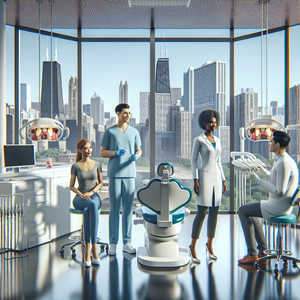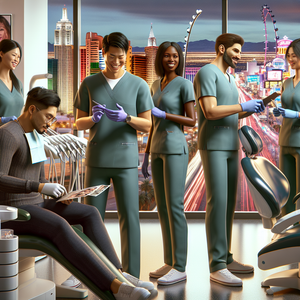The Future of Vet Assistants: Trends, Salaries, and Career Advancement Opportunities

The veterinary field is witnessing several transformative trends that directly affect the role of vet assistants.
Emphasis on Preventive Care
One of the most significant trends is the growing emphasis on preventive care and wellness checks for pets. As pet owners become more proactive about their animals' health, veterinary practices are expanding their services to include more comprehensive care options. Vet assistants are now required to develop a broader skill set, including knowledge of nutrition, pet behavior, and preventive health measures.
Integration of Technology
Another noteworthy trend is the integration of technology in veterinary practices. From telemedicine consultations to advanced diagnostic tools, technology is reshaping how veterinary care is delivered. Vet assistants are now expected to be tech-savvy, assisting veterinarians with electronic health records and utilizing new software for scheduling and patient management.
Focus on Specialized Care
The rise in specialized veterinary services, such as emergency care and oncology, also presents new opportunities for vet assistants. As these specialties become more prevalent, the demand for support staff who are knowledgeable in these areas will increase.
Salary Growth Potential
Understanding the salary landscape for vet assistants is crucial for those considering a career in this field.
Factors Influencing Salary
Emerging trends suggest that vet assistants who invest in further education and specialized training can expect higher wages. For instance, those who pursue certifications in animal behavior, emergency care, or specialized veterinary fields may command higher salaries.
Future Salary Trends
As the veterinary industry continues to grow, the salary potential for vet assistants is also expected to rise.
Career Advancement Opportunities
The future for vet assistants is not just about immediate roles but also about long-term career pathways.
Pathway to Veterinary Technician
One common trajectory is to become a veterinary technician, which typically requires additional education and certification.
Specialized Roles and Leadership
Another avenue for growth includes transitioning into specialized roles within veterinary practices, such as dental technicians, surgical assistants, or practice management.
The future of vet assistants is bright, characterized by evolving trends that demand a more skilled and adaptable workforce. As veterinary practices continue to grow and integrate technology, there are ample opportunities for vet assistants to enhance their skills, increase their earning potential, and advance their careers.
Veterinary Technician
Animal hospitals, veterinary clinics, research facilities
Core Responsibilities
Perform diagnostic tests such as blood work, urinalysis, and radiography under the supervision of a veterinarian.
Administer anesthesia and monitor patients during surgical procedures, ensuring their safety and comfort.
Educate pet owners on post-operative care, nutrition, and preventive health measures.
Required Skills
Certification as a Veterinary Technician (CVT or RVT) is required.
Strong knowledge of animal anatomy, physiology, and pharmacology.
Excellent communication skills for interacting with pet owners and veterinary staff.
Veterinary Practice Manager
Veterinary clinics, animal hospitals, multi-location veterinary groups
Core Responsibilities
Oversee the daily operations of a veterinary practice, including staff management, budgeting, and client relations.
Implement policies and procedures to improve workplace efficiency and client satisfaction.
Coordinate staff training programs and ensure compliance with veterinary regulations and standards.
Required Skills
Proven experience in management or administration within a veterinary or healthcare setting.
Strong organizational and leadership skills, with the ability to motivate a team.
Familiarity with veterinary software for scheduling and billing.
Veterinary Emergency and Critical Care Technician
Emergency animal hospitals, specialty veterinary clinics
Core Responsibilities
Provide immediate care to critically ill or injured animals, including triage, resuscitation, and stabilization.
Collaborate with veterinarians to develop emergency treatment plans and monitor patient progress.
Maintain emergency equipment and ensure that supplies are stocked and ready for use.
Required Skills
Certification as a Veterinary Technician with a focus on emergency and critical care (VETT, ECC).
Ability to work in a fast-paced environment and handle high-stress situations effectively.
Strong problem-solving skills and attention to detail.
Certified Veterinary Behavior Technician
Veterinary practices, animal shelters, training facilities
Core Responsibilities
Assess and address behavioral issues in pets through training and rehabilitation techniques.
Conduct behavior consultations with pet owners and develop individualized behavior modification plans.
Collaborate with veterinarians to integrate behavioral health into overall pet care.
Required Skills
Certification from the Animal Behavior Society or a similar organization.
Knowledge of animal behavior theories, training methodologies, and behavior modification techniques.
Strong interpersonal skills for working with pet owners and educating them on behavior management.
Veterinary Dental Technician
Veterinary clinics, animal hospitals, specialty dental practices
Core Responsibilities
Assist veterinarians in performing dental procedures, including cleanings, extractions, and oral surgeries.
Conduct dental radiographs and maintain dental records for each patient.
Educate pet owners on proper dental hygiene practices and preventive care for oral health.
Required Skills
Specialized training or certification in veterinary dentistry (e.g., VDT).
Good manual dexterity and attention to detail for performing intricate dental tasks.
Ability to work collaboratively with veterinarians and veterinary technicians.


